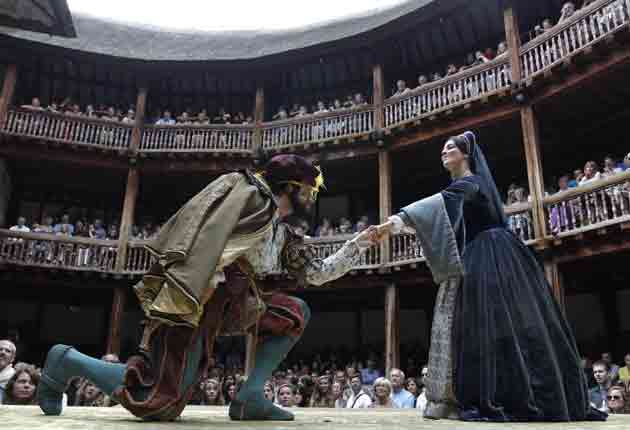Globe develops new theatre for when it raineth

Your support helps us to tell the story
From reproductive rights to climate change to Big Tech, The Independent is on the ground when the story is developing. Whether it's investigating the financials of Elon Musk's pro-Trump PAC or producing our latest documentary, 'The A Word', which shines a light on the American women fighting for reproductive rights, we know how important it is to parse out the facts from the messaging.
At such a critical moment in US history, we need reporters on the ground. Your donation allows us to keep sending journalists to speak to both sides of the story.
The Independent is trusted by Americans across the entire political spectrum. And unlike many other quality news outlets, we choose not to lock Americans out of our reporting and analysis with paywalls. We believe quality journalism should be available to everyone, paid for by those who can afford it.
Your support makes all the difference.It was the 17th-century upmarket alternative to Shakespeare's Globe, where the upper crust could watch the Bard's plays away from the great unwashed. Now, a modern replica of the old Blackfriars Theatre, with a roof (thank goodness) and seating for all, will shelter rain-free comfortable theatre for present-day fans.
Shakespeare's Globe plans to develop an £8m replica of the Jacobean theatre, which closed in 1642, at its site on the capital's South Bank.
"I like the audience that frequenteth there," wrote playwright John Marston of Blackfriars Theatre in 1600. "With much applause a man shall not be choked with the stench of garlic nor be pasted to the balmy jacket of a beer-brewer."
A modern equivalent will appease those complaining about the contemporary Globe's three-hour standing sessions while wearing rain-soaked plastic ponchos.
"The plan has been on the cards for a long time and we always thought it was a necessary part of who we are," said Dominic Dromgoole, the Globe's artistic director.
"Like the original, we hope this new theatre will serve as a place into which audiences can decant when it is too rainy. It's stayed dormant because we haven't had the time or the resources but now we've secured a fair chunk of money and have the determination to take this forward."
Mr Dromgoole said he had secured £3m of the project's funds from the Globe's own coffers and an anonymous US benefactor.
The new 320-seat theatre is based on a set of plans discovered in the 1960s in the archives of Worcester College, Oxford. The blueprints show a small 17th-century indoor theatre, with a U-shaped galleried auditorium around a stage. These plans were originally believed to be the work of architect Inigo Jones but are now attributed to his protégé John Webb. Mr Dromgoole said that they were the best indicator of what an indoor Jacobean theatre would look like.
"The space will allow us to take on a more intense form of production. It will be great for us to take on a wider repertoire, including the plays of other Jacobean playwrights like Thomas Middleton who would have performed in the Blackfriars. We can put on more récherché productions because of this theatre's smaller capacity."
The Shakespeare scholar Stanley Wells said: "Everyone had seats, and it cost sixpence to attend a performance instead of one penny at the Globe. It was the posh theatre, and allowed playwrights to experiment with more elaborate stage effects which they could hang from the ceiling. Plays such as The Tempest were designed with the Blackfriars expressly in mind.
"While the modern-day Globe provides some shelter, this new version should provide total respite from the rain," Mr Wells added.
The Globe aims to open the new theatre in November 2013. The shell of the new theatre was developed alongside the existing Globe in 1997, but was never completed. That space was temporarily converted to house rehearsal rooms and education spaces. The venue will contain two tiers of galleried seating and an authentic pit area. The original theatre was on the site of a former Dominican monastery.
Yesterday, Mr Dromgoole also announced plans for the Globe to host performances of all of Shakespeare's 38 plays in 38 languages in a six-week spell before next year's Olympic Games.
Join our commenting forum
Join thought-provoking conversations, follow other Independent readers and see their replies
Comments